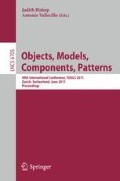Abstract
Reusability is an important software engineering concept actively advocated for the last forty years. While reusability has been addressed for systems implemented using the same programming language, it does not usually handle interoperability with different programming languages. This paper presents a solution for the reuse of Java code within Eiffel programs based on a source-to-source translation from Java to Eiffel. The paper focuses on the critical aspects of the translation and illustrates them by formal means. The translation is implemented in the freely available tool J2Eif; it provides Eiffel replacements for the components of the Java runtime environment, including Java Native Interface services and reflection mechanisms. Our experiments demonstrate the practical usability of the translation scheme and its implementation, and record the performance slow-down compared to custom-made Eiffel applications: automatic translations of java.util data structures, java.io services, and SWT applications can be re-used as Eiffel programs, with the same functionalities as their original Java implementations.
Access this chapter
Tax calculation will be finalised at checkout
Purchases are for personal use only
Preview
Unable to display preview. Download preview PDF.
References
Achee, B.L., Carver, D.L.: Creating object-oriented designs from legacy FORTRAN code. Journal of Systems and Software 39(2), 179–194 (1997)
Canfora, G., Cimitile, A., Lucia, A.d., Lucca, G.A.D.: A case study of applying an eclectic approach to identify objects in code. In: IWPC, pp. 136–143 (1999)
Cordy, J.R.: Source transformation, analysis and generation in TXL. In: PEPM, pp. 1–11 (2006)
de Lucia, A., Di Lucca, G.A., Fasolino, A.R., Guerra, P., Petruzzelli, S.: Migrating legacy systems towards object-oriented platforms. In: Proc. of ICSM, pp. 122–129 (1997)
Dietrich, W.C., Nackman Jr., L.R., Gracer, F.: Saving legacy with objects. SIGPLAN Not. 24(10), 77–83 (1989)
Gall, H., Klosch, R.: Finding objects in procedural programs: an alternative approach. In: WCRE, pp. 208–216 (1995)
Google Web toolkit (2010), http://code.google.com/webtoolkit/
J2Eif. The Java to Eiffel translator (2010), http://jaftec.origo.ethz.ch
Kontogiannis, K., Patil, P.: Evidence driven object identification in procedural code. In: STEP, pp. 12–21 (1999)
Llamosí, A., Strohmeier, A. (eds.): Ada-Europe 2004. LNCS, vol. 3063. Springer, Heidelberg (2004)
Mauve project (2010), http://sources.redhat.com/mauve/
Mcilroy, D.: Mass-produced software components. In: ICSE, pp. 88–98 (1968)
Meyer, B.: The component combinator for enterprise applications. In: JOOP, vol. 10(8), pp. 5–9 (1998)
Millham, R.: An investigation: reengineering sequential procedure-driven software into object-oriented event-driven software through UML diagrams. In: COMPSAC, 2002, pp. 731–733 (2002)
Müller, P., Nordio, M.: Proof-Transforming Compilation of Programs with Abrupt Termination. In: SAVCBS 2007, Dubrovnik, Croatia, pp. 39–46 (2007)
Newcomb, P., Kotik, G.: Reengineering procedural into object-oriented systems. In: WCRE, pp. 237–249 (1995)
Nordio, M.: Proofs and Proof Transformations for Object-Oriented Programs. PhD thesis, ETH Zurich (2009)
Postema, M., Schmidt, H.W.: Reverse engineering and abstraction of legacy systems. Informatica, 37–55 (1998)
Serrano, M.A., Carver, D.L., de Oca, C.M.: Reengineering legacy systems for distributed environments. J. Syst. Softw. 64(1), 37–55 (2002)
Sneed, H.M.: Migration of procedurally oriented cobol programs in an object-oriented architecture. In: Software Maintenance, pp. 105–116 (1992)
Subramaniam, G.V., Byrne, E.J.: Deriving an object model from legacy Fortran code. In: ICSM, pp. 3–12 (1996)
Wiggerts, T., Bosma, H., Fielt, E.: Scenarios for the identification of objects in legacy systems. In: WCRE, pp. 24–32 (1997)
Yeh, A., Harris, D., Reubenstein, H.: Recovering abstract data types and object instances from a conventional procedural language. In: WCRE, pp. 227–236 (1995)
Zou, Y., Kontogiannis, K.: A framework for migrating procedural code to object-oriented platforms. In: APSEC, pp. 390–399 (2001)
Author information
Authors and Affiliations
Editor information
Editors and Affiliations
Rights and permissions
Copyright information
© 2011 Springer-Verlag Berlin Heidelberg
About this paper
Cite this paper
Trudel, M., Oriol, M., Furia, C.A., Nordio, M. (2011). Automated Translation of Java Source Code to Eiffel. In: Bishop, J., Vallecillo, A. (eds) Objects, Models, Components, Patterns. TOOLS 2011. Lecture Notes in Computer Science, vol 6705. Springer, Berlin, Heidelberg. https://doi.org/10.1007/978-3-642-21952-8_4
Download citation
DOI: https://doi.org/10.1007/978-3-642-21952-8_4
Publisher Name: Springer, Berlin, Heidelberg
Print ISBN: 978-3-642-21951-1
Online ISBN: 978-3-642-21952-8
eBook Packages: Computer ScienceComputer Science (R0)

